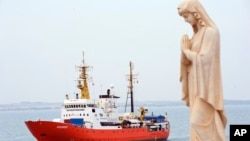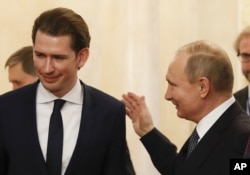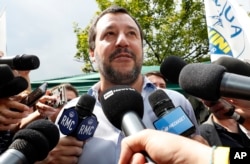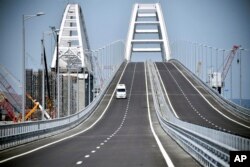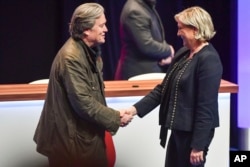European Union officials are preparing for a trade war with the United States, but on another front, they're bracing for equally hazardous challenges closer to home from central and southern European populists, who see themselves as ideological allies of President Donald Trump and appear to share his goals.
Officials fear the recent acrimonious G-7 summit in Canada will embolden populist-led governments they dub "the awkward squad" to redouble their pushback on Brussels over migration, public spending,the sovereign rights of member states, and the issue of EU sanctions on Russia.
And, along with Europe's "establishment" politicians, EU officials say Trump "confederates," from the outspoken U.S. ambassador to Germany, Richard Grenell, to former White House adviser Steve Bannon, are not making their lives any easier by fanning populist flames in Europe.
Hungary
Hungary's prime minister, Viktor Orban, increasingly seen as "Trump on the Danube," has already served notice of his intention to pursue broad legal changes, including possibly enshrining "Hungarian values" and national identity in the country's constitution, a move likely to fall afoul of EU rules.
His spokesman, Zoltan Kovacs, told reporters ahead of the G-7 that core national values should be beyond the purview of EU courts and enshrining them in Hungary's constitution would be part of an effort to counter EU legislation "that's in the end trying to create a federal Europe by undermining the powers of national governments."
Austria
Austria's new chancellor, 31-year-old Sebastian Kurz, who heads a coalition government of his populist People's Party and the far-right Freedom Party, is planning to block immigrants, including refugees, from receiving benefits during their first five years in the country and to reduce social benefits they do get thereafter, if they cannot speak German.
The action would put his government on a collision course with Brussels and the European courts because under EU legislation, member states are required to treat all citizens equally. Kurz has been described as a "rock star" by Grenell. The U.S. envoy prompted criticism earlier this month for breaching diplomatic norms when he invited to lunch the Austrian chancellor when Kurz was on an official visit to Berlin.
Austria will take over the six-month rotating presidency of the EU next month, giving it an influential role in setting the bloc's agenda.
Kurz has said his priority for the presidency is to stop more migrants entering the EU by "safeguarding" Europe's borders. He will also put his weight against member states being required to accept burden-sharing migrant resettlement quotas — a key issue also for the four-nation Visegrad Group of central European countries of Hungary, Poland, Slovakia and the Czech Republic, which has been a critic of EU migrant policies.
And led by Orban, a liberal-turned-conservative nationalist, they are making no effort to disguise their overall aim of reshaping the EU by taking power away from the EU institutions in Brussels and returning it to national governments.
Italy
On that they can now count on the support of Italy's new coalition government, whose populist interior minister, Matteo Salvini, on Sunday announced he was closing Italian ports to NGO ships carrying migrants from North Africa. That decision prompted Spain to accept a humanitarian rescue vessel that was stranded at sea with 629 migrants on board.
On Monday, Salvini was in a triumphalist mood. "We have opened a front in Brussels," Salvini said in a statement promising more confrontations in the future with NGOs which he says fuel people-smuggling by providing rescue services at sea.
The new hardline Italian approach by the ruling coalition of Salvini's far-right League and the populist Five Star Movement followed an election campaign this year in which Salvini vowed to adopt tough polices on migrants and has pledged to deport half-a-million illegal migrants.
More than 600,000 people have reached Italy by boat from Africa in the past half a decade. Salvini's closure of the ports to NGO ships was criticized by the Vatican and some mayors in the south of Italy, including by Palermo's, which threatened to resist the order.
But pollsters say this proving popular among ordinary Italians, who have been fuming about the migrant influx and complain Italy is being turned into a vast refugee camp, straining the country's resources and impacting their way of life and culture.
Slovakia, Czech, Poland
Hungary, Austria and Italy won't be alone in throwing down gauntlets to the EU in the coming weeks. Slovakia, the Czech Republic and Poland are all on a collision course with Brussels and not only over migration but also on "reforms" aimed at curtailing the independence of national courts, curbing media freedom and civil rights and strengthening the power of central governments.
The Russian problem
Confrontations are also looming over relations with Russia, which will see the populists clash with Brussels, Berlin and Paris. Italy's prime minister, Giuseppe Conte, has announced he will press for the lifting of EU sanctions on Russia for the Kremlin's 2014 annexation of Crimea. At the G-7 summit, Conte supported President Trump's call for Russia to be readmitted to the rich nations' club.
Other European populist leaders have expressed sympathy with the idea of lifting sanctions, although their Polish counterparts are against it.
The unfolding populist challenge to politics as usual was welcomed publicly earlier this month by the U.S. envoy to Germany, who prompted an outcry from mainstream politicians in Germany, when he told the conservative site Breitbart, once run by former Trump strategist Steve Bannon, that he saw his mission as empowering populists in Europe and political factions in tune with Trump's Washington.
Ambassadors traditionally don't comment on the domestic politics of countries to which they are posted and Grenell's comments earned demands for an explanation from the German Foreign Ministry and a rebuke from Martin Schulz, former leader of the Social Democratic Party and onetime EU official. "What this man is doing is unheard of in international diplomacy," said Schulz.
Later, Grenell said his comments had been misunderstood and that he was not favoring one political faction over another. State Department spokeswoman Heather Nauert also defended the ambassador, telling reporters subsequently the envoy was "merely highlighting that there are some parties and candidates in Europe who are doing well right now."
The populist resurgence has also been welcomed by Bannon, who has become a key traveling populist ideologue.
Bannon: Populist cheerleader
Trump's chief election strategist, who remains influential in Washington after departing the White House and clashing with the U.S. president, has overtly set himself the task of whipping up the rebellious fervor of what he sees as a global populist movement, which he believes is on the right side of history.
By his own admission, Bannon's role has gone beyond cheerleading the continent's populist factions to a leadership function involving tours of Europe and offering his political savvy to rising far-right and populist forces.
He is credited with having persuaded Italy's Salvini to conclude a pact with Luigi Di Maio's anti-establishment Five Star Movement.
Last week in Britain's Spectator magazine, he noted he held meetings in Rome with populist-nationalist leaders from across Europe, including Germany, France and Hungary. Bannon also said he was in close touch with Salvini and other like-minded Italian leaders as they struggled to form a coalition government, the first populist one in western Europe, in the face of resistance from Italy's centrist President, Sergio Mattarella. "All the brothers came to Rome," he said.
In a speech in Rome, he announced if the populist government works in Italy, "it's going to show that we've broken the back of the globalists."
The populist resurgence this year after election setbacks for insurgent nationalist political movements in France and the Netherlands in 2017, has taken Europe's centrist politicians and EU officials by surprise. They thought the populist high water mark had been reached and that the anti-globalist, nationalist wave would start receding.
"There was big wave of optimism after the French election," according to Federico Santi, a political analyst. "But the problem hadn't gone away."
Euro-skeptics say that was always a misplaced forecast, saying polls point to rising nationalist sentiment, negative attitudes toward greater EU political integration and continued frustration with traditional democratic politics, sluggish economies and migration. And they say Europe's mainstream politicians have only themselves to blame for failing to address real political frustrations and the rising resistance to one-size-fits-all European governance.




